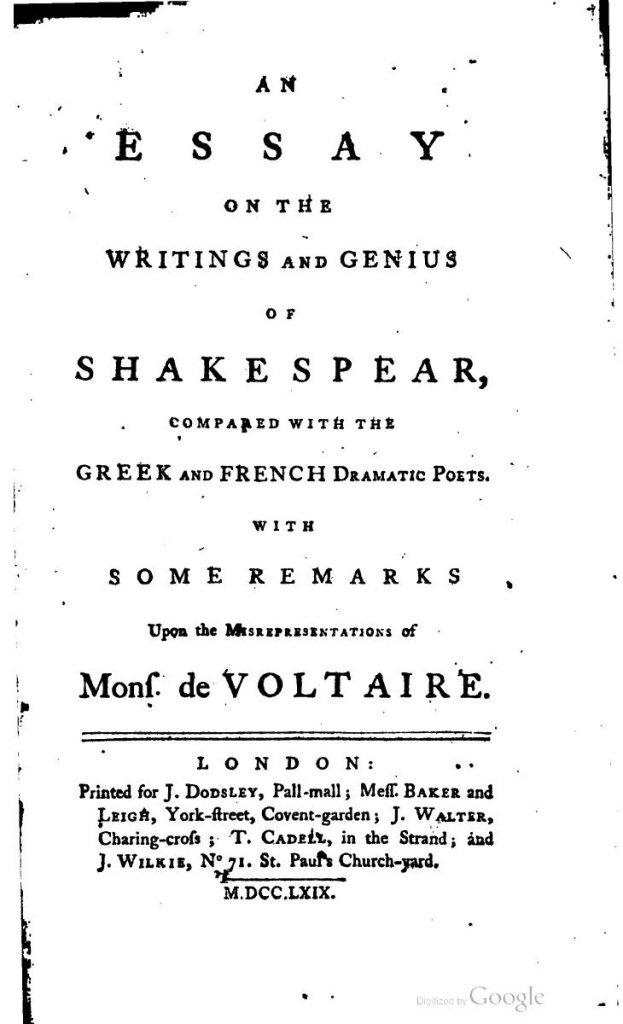The German reception of Elizabeth Montagu’s An Essay on the Writings and Genius of Shakespear (1769)
The German Reception of Elizabeth Montagu's An Essay on the Writings and Genius of Shakespear (1769)
Joke Brasser, University of Utrecht

The original, anonymous, edition of Montagu's Essay on Shakespeare, published in 1769 by James Dodsley.
When Voltaire’s Letter xviii ‘on Tragedy’ (published in England in 1733) claimed that Shakespeare lacked both taste and knowledge of the rules of the drama, the French Enlightenment writer and philosopher was not very far from the early eighteenth-century consensus on Shakespeare in England. One of the main critical discussions centered on the question whether Shakespeare willfully neglected the classical rules of drama or was simply ignorant of them. Voltaire’s attack of the English dramatist sparked fierce responses including Elizabeth Montagu’s Essay on the writings and genius of Shakespear, compared with the Greek and French dramatic poets. With some remarks upon the misrepresentations of Mons. de Voltaire, published in 1769. Huchon argues that Voltaire’s attack upon the English bard focused the debate on the question of national literatures, and a national tradition of literary criticism.[1] But Montagu’s essay was received and read beyond Britain; it was translated into German (1771), French (1777) and Italian (1828) and was read and commented upon by critics that are now canonized as leading figures in Shakespeare criticism, both in England and Germany.
Looking at a range of the British compendiums of literary criticism and Shakespeare Studies one would deem Elizabeth Montagu’s Essay of little importance. She is no more than a ‘footnote critic’, absent from Rene Wellek’s four-volume canon of literary criticism in which Madame de Staël and Margaret Fuller alone represent women’s contribution to one hundred and fifty years of scholarship. [2] Although contemporary scholars (Eger, Ritchie, Faye) have pointed to some of the proto-romantic themes in her essay, her influence upon romantic criticism has not been studied in depth.[3]

Fig.1 - Trulli, Puglia, Italy.
The German reception of Montagu’s Essay suggests a completely different sense of Montagu’s importance and influence as a Shakespeare critic. Montagu’s Essay was translated into German in 1771 and was favorably received by her contemporaries. German Shakespeare scholarship – both older studies from the 70s and 80s, as well as current studies – place her essay right at the heart of the force field of the emerging romantic modes of reading Shakespeare. How should we make sense of this different appraisal? In her own time, Montagu was read and commented upon by leading German critics such as Johann Gottfried (von) Herder (1744-1803). He wrote a laudatory review of her essay but also reworked many of her ideas into his own essay on Shakespeare that would be published in the 1773 manifesto of the Sturm und Drang (Storm and Stress) movement, Of German Character and Art.[4]
Herder’s importance for Romantic thought has been firmly established today. Wellek calls him “the great initiator” and the builder of a new romantic poetics.[5] Interestingly, Anglophone critics who discuss Herder’s ‘Shakespeare’ fail to mention Montagu’s influence upon this work. Wellek records a whole list of English critics who influenced Herder but Montagu does not appear on his list, even though her influence was much more tangible and direct.[6] Gregory Moore, who translated Herder’s ‘Shakespeare’ into English in 2008 does not discuss the Montagu-Herder connection either, he only refers to Montagu’s Essay and Herder’s review of it in a footnote.[7] Price’s study of the reception of English literature in Germany does mention Montagu’s Essay in relation to Herder, but he mistakes her for her contemporary Lady Mary Wortley Montagu (1689-1762) and he does not bother to make a comparison between Montagu and Herder’s views. German critics dealing with Herder’s essay do pay attention to his thorough indebtedness to Montagu, Paulin, Proß and Stellmacher mention the influence of Montagu’s Essay upon Herder. In the following, I will show that Herder read Montagu’s essay with an unbiased view, and would take on board some of her arguments and points.
Montagu and Herder

Eschenburg's translation of Shakespeare into German prose. © The Shakespeare Birthplace Trust
Johann Gottfried Herder read Montagu’s Essay in Johann Joachim Eschenburg’s translation of 1771, and with Eschenburg, naturally assumed its anonymous author to be a man. Eschenburg would edit and complete the first grand-scale German Shakespeare translation in 1777 (with Christoph Wieland) and his publish his own study on Shakespeare in 1787.
We know that Herder read Montagu’s Essay carefully, not only from his laudatory review of Eschenburg’s translation but also from studying the different drafts of his own Shakespeare essay. Before Herder wrote the final version of this essay, he wrote two drafts that show pointed differences in emphasis and subject matter. His first draft does not mention Montagu’s piece. The second and final drafts of his essay, however, both references the anonymous author of the Shakespeare Essay, and also take up many of her themes and emphases. The final version shows a thorough reworking of Montagu’s leading ideas. Nevertheless, Herder mentions Montagu’s name only in passing when he criticized her essay for not having elaborated enough on the way in which Shakespeare was able to transform popular romances and tales into his dramas.
In order to shed a light on the Montagu-Herder connection, I will briefly compare both approaches to Shakespeare and point to Herder’s indebtedness to Montagu’s critical piece. Herder takes up many of her themes, which were crucial to the Romantic understanding of Shakespeare and art. Montagu’s Essay is right at the heart of this discourse. The German reception of Elizabeth Montagu’s Essay is therefore key to understanding her influence on Romantic critical ideas on Shakespeare in Germany and England.[9]
Elizabeth Montagu’s Essay on Shakespeare
More than just a critique of Voltaire, Montagu’s Essay explores new modes of reading Shakespeare. She proposes a new principle which to judge Shakespeare’s merits. She started from a definition of dramatic poetry which, according to Montagu, developed differently on English and Ancient Greek stages. For Montagu, drama was a subspecies of poetry, whose common aim it is to instruct by entertaining. The specific aim of drama is ‘the effecting of moral purposes by the representation of a fable’.[11] Montagu continues to query if Shakespeare’s plays answer the noblest end of the drama, moral instruction, and if his dramatic imitation has “proper dramatic excellence.”[12]
Montagu’s assessment that“the drama requires a specific criticism” is based not only on her refutation of French classical doctrine of literary and dramatic criticism, she also wanted to underscore the uniqueness of Shakespeare in Essay.[13] The general aim of the essay was to demonstrate “the genius of Shakespeare through the whole extent of the poet’s province” and this includes an emphasis on Shakespeare’s supernatural imagination.[14]
The Essay opens with a general definition of the aim of dramatic poetry, after which she goes into the specific qualities of Shakespeare’s historical dramas, using the example of the first and second part of Henry IV that are each discussed in separate chapters. The following chapter is devoted to the “preternatural beings” that Shakespeare employs, followed in the next chapter by an analysis of Macbeth that pays particular attention to Shakespeare’s representation of the witches and their role in the play. Montagu is predominantly original in her ideas on the historical dramas and Shakespeare’s supernatural imagination. This line of reasoning was taken up by Herder, as we will see.
Montagu’s defense of English Historical Drama

'David Garrick as Richard III', William Hogarth (1745) - Garrick's performances defined Shakespeare's History plays across the eighteenth-century.
Montagu’s nationalistic defense of Shakespeare’s “home-born dramas” attacks the hegemony of French neoclassicism and its universal principles of taste.[15] “French poets,” she writes, “assume a superiority over Shakespeare, on account of their more constant adherence to Aristotle’s unities”.[16] She argues that the Aristotelian unities should not be interpreted as universal rules for drama, but rather as Aristotle’s description of the working principles of the tragedies of Aeschylus and Sophocles. This idea was also expressed in Pope’s ‘Preface’ of 1725, but Montagu really explores its consequences.[17] She concludes that Aristotle’s rules do not apply to Shakespeare’s plays, and that we therefore need a new principle of literary criticism. In order to account for the differences between Sophocles’ tragedies and Shakespeare’s dramas she compares the different historical moments in which these plays came into being, and how they were to be performed.[18]
Shakespeare’s plays were to be acted in a paltry tavern, to an unlettered audience, just emerging from barbarity; the Greek tragedies were to be exhibited at the public charge, under the care and auspices of the magistrates at Athens; where the very populace were critics in wit, and connoisseurs in public spectacles.[19]
The underlying assumption of the barbarity of the Elizabethan era was a commonplace in eighteenth-century criticism, and was usually used to Shakespeare’s lack of sophistication. According to Montagu, ancient Greece and Rome however were “periods of noble and graceful simplicity” which produced “perfect” and “faultless” compositions.[20] Montagu conceptualizes aesthetics and taste as diverse, individual and historically specific. “As there are poets of various talents, and readers of various tastes,” Montagu argues, “one would rather wish all fields of Parnassus might be free and open to men of genius, than that a proud tyrannical spirit of criticism should controul us in the use of them”.[21]
French dramatic art that seeks to imitate Ancient tragedies and follow Aristotle’s rules only give “exterior representations” of the formal qualities of their examples. Montagu thus concludes that French drama has founded its superiority over the English on “some trivial beauties”. In addition, Montagu judges French dramas as “undramatic”; “A French drama is a tissue of declamations, and some laboured recitals of the catastrophe, by which the spirit of the drama is greatly weakened and enervated”.[23] These mechanical “puppet-shows” cannot effect the chief purpose of the theatrical institution, since they give a false representation of the manners of their characters. In addition, according to Montagu, the subject matter of ancient tragedies is fundamentally based on their mythology that it becomes unfit to be represented on a modern stage. A dramatic poet should rather appeal to the lives and experiences of his audience, the common people.
This genre unites “the force and lustre of poetic language” with “the authority of history”, and it is perfectly tailored to the needs of its audience: “[a]s the misfortunes of nations as well as of individuals often arise from their peculiar dispositions, customs, prejudices, and vices, these home-born dramas are excellently calculated to correct them”.[24] Historical drama is a generic mixture that combines history and poetry, tragedy and comedy, and is thus able to represent the manners of the people, and gives the general temper and concerns of the times. The idea that a poet should take his subjects from the history and traditions of his own country and address a national audience would be taken up by Herder in his Shakespeare essay.
Herder’s Shakespeare Essay

The first page of Herder's 'Shakespeare' (1773)
At the core of Herder’s essay is the notion that art and literature is historically determined. In this vein, Herder explores the different conditions under which the Greek and modern English stage came into being. Following Aristotle, Herder locates the origins of Greek tragedy in an introductory tale, improvised by the leader of the chorus. This origin also explains the simplicity of the Greek plots that is described in Aristotle’s unity of action. From this, Herder concludes that the unity of action, as well as the other unities, are not set aesthetic rules, but natural consequences of the contemporary conditions of the Greek stage. It therefore would be fruitless to enforce and imitate these aesthetic principles onto the modern stage. From this Herder concludes, following Montagu, that French drama entirely ignores the essence of the exemplum it seeks to imitate. Instead, it only recreates outward similarities missing dramatic essence. For this reason, Herder characterizes French drama as declamations and sententious speeches, and leaves it up to his reader to decide whether a copy of the outward qualities of the drama could qualify as a reflection of the highest form of national literary expression?
From this we may conclude that Herder, again following Montagu, sees drama as a national institution. Herder elaborates that Shakespeare’s drama developed under specific historical, religious and geographical circumstances which differed remarkably from those in ancient Greece. Greek and English drama do however, have the same dramatic essence; catharsis. Herder goes on to identify Shakespeare as Sophocles’ brother, or as the modern Sophocles. This modern Sophocles is in need of his own Aristotle, who would elucidate the complexities of his dramatic constitution.[26] Wolfgang Proß concludes from this that Herder envisions himself in that role, since his essay aims to explore the working principles of Shakespeare’s dramas.[27]
For Herder, the dramatic poet is also the people’s poet, whose aim it is to instruct and cultivate them. All of the points Herder makes about Shakespeare; portraying him as the northern bard, whose genius is rooted in English soil and is determined by specific historical circumstances, characterizing him as the poet of the people who aims to instruct them and entertain are essentially from Montagu’s Essay. Even the manner in which Herder criticizes French drama, calling them declamations and sententious speeches, is borrowed directly from Montagu. However, Herder differs from Montagu in the audience that he addresses, and also in his own agenda for holding up Shakespeare as an example. Whereas Montagu defends the national bard to an English audience, Herder specifically addresses a German audience that does not have a strong national identity or a national literature like England does, because of Germany’s different historical development and geo-political make-up. Herder’s essay expresses the need for an analysis of Shakespeare’s method that would enable Germany to create its own national literature rooted in their own traditions and folktales.

Herder, Another Philosophy of History (1774)
Herder concludes his Shakespeare essay with the statement that “the heart of his enquiry” would be to determine how Shakespeare transformed popular tales and ballads into the “living wholes” of his dramas.[28] Interestingly, he does not do it here. However, as Proß suggests, Herder’s Shakespeare Essay provides the basis for Another Philosophy of History from 1774, in which Herder stresses the influence of historical circumstances upon human development. Equally, the Essay was the impulse for Herder’s collection of German folksong published in 1778.
To conclude, it is important to note that both Montagu and Herder assume that Shakespeare drama obey an aesthetics that can only be understood in its own historical and cultural context. Both are thus arguing for a literary-historical understanding of art, and imply that when a reconstruction of a work in its own historical context has become impossible, the work will no longer be understood properly. In this context, Montagu compares Shakespeare’s dramas to Stonehenge:
Will not an intelligent spectator admire the prodigious structures of Stone-Henge, because he does not know by what law of mechanics they were raised? Like them, our author’s works will remain forever the greatest monuments of the amazing force of nature, which we aught to view as we do other prodigies, with an attention to, and admiration of their stupendous parts, and proud irregularity of greatness.[29]
Stonehenge and Shakespeare’s plays are both products from distant historical moments that are, or should be, admired as “monuments of the amazing force of nature”. Montagu seems to suggest that the admiration for Shakespeare’s ‘irregular’ genius is based upon an unfamiliarity with, and historical distance from its aesthetic principles and taste.
Herder echoes this line of argument. He replaces Stonehenge for the pyramids and, in a similar vein, foresees that there will be a moment when Shakespeare is so distant in time from his readers that he will no longer be understood. The great bard will be perceived as the ancient pyramids are perceived in his day; as colossal works of art that everyone gazes upon in awe without truly understanding their greatness. [30]
Montagu’s Essay signals a departure from neoclassical aesthetics and towards a Romantic understanding of art. Neoclassical doctrine emphasizes that a dramatist should transcend his own times and represent universal truths, Montagu defends Shakespeare’s genius from the opposite point of view; for her an artist should address his audience by appealing to their specific national history, customs and to their national superstitions. Montagu’s literary-historical interpretation of Shakespeare’s dramatic art and her emphasis on ‘the native soil’ of the artist, as Herder would phrase it, is central to the understanding of Romanticism’s interpretation of essence and role of art.
Montagu concludes her essay with the remark “I hope this weak attempt to vindicate our great dramatic poet, will excite some critic able to do him more ample justice”. [31] Without implying Herder’s critical superiority over Montagu, her essay indeed excited and inspired other critics and many of her ideas would become part of one of the key canonical pieces of Romantic literary criticism.
[1] R. Huchon, Mrs. Montagu and her Friends (London: John Murray, 1906), p. 101.
[2] René Wellek, A History of Modern Criticism 1750-1950: The Later Eighteenth Century (New Haven:Yale UP, 1955), p. 81.
[3] Elizabeth Eger, “‘Out rushed a female to protect the bard:’ The Bluestocking Defense of Shakespeare.” Reconsidering the Bluestockings. Eds. Nicole Pohl and Betty A. Schellenberg (San Marino: Huntington Library, 2003), pp. 127-52; Fiona Ritchie, “Elizabeth Montagu: ‘Shakespeare’s poor little critic?’” Shakespeare Survey 58 (2005): 72-82; Elizabeth Fay, A Feminist Introduction to Romantic Studies (Oxford: Wiley Blackwell,1991). See also Fiona Ritchie, Women and Shakespeare in the Eighteenth Century (Cambridge: Cambridge University Press, 2014).
[4] Johann Gottfried Herder, “Versuch über Shakespeares Genie und Schriften in Vergleichung mit den dramatischen Dichtern der Griechen und Franzosen. Aus dem Englischen übersetzt, und mit einen doppelten Anhange begleitet von J.J. Eschenburg. Leipz. 1771,’ Johann Gottfried Herder, Sämtliche Werke, ed. Bernhard Suphan, XXXIII vols (1891, Hildesheim: Georg Olms Verlagsbuchhandlung, 1979), V., pp. 312-17
[5] Welleck, p. 200.
[6] “Blackwell, Harris, Shaftesbury, Brown, Young, Percy and Warton”, ibid., p. 181.
[7] Johann Gottfried von Herder, Shakespeare, transl. by Gregory Moore, (Princeton: Princeton University Press, 2011), p. 69.
[8] Lawrence Marsden Price, The Reception of English Literature in Germany (Berkeley: U of California P, 1932), pp. 296-7.
[9] For a more comprehensive account of Montagu’s reception in Germany, please refer to my master’s thesis (https://dspace.library.uu.nl/bitstream/handle/1874/251733/Thesis%20FINAL.pdf?sequence=1).
[10] Elizabeth Montagu, An Essay on the writings and Genius of Shakespear, compared with the Greek and French Dramatic Poets. With Some Remarks Upon the Misrepresentations of Mons. de Voltaire, 5th edition (London: Printed for Charles Dilly, 1785 ). I will be quoting from Montagu, Elizabeth. “An essay on the writings and genius of Shakespear, compared with the Greek and French dramatic poets. With some remarks upon the misrepresentations of Mons. de Voltaire,” Writings of the Bluestocking Circle, 1738-1785:
Elizabeth Montagu, ed. Elizabeth Eger (London: Pickering & Chatto, 1999), Vol. I.
[11] Ibid., p. 5
[12] Ibid., p. 5.
[13] Ibid., p. 240.
[14]Ibid., p. 50.
[15] Ibid., p. 21.
[16] Ibid., p. 2.
[17] Alexander Pope, The Works of Shakespear in Six Volumes, Collated and Corrected by Mr Pope, 6 vols. (London: Jacob Tonson, 1725).
[18] Her comparative approach precedes the work of Anne Louise Germaine de Staël-Holstein (Madame de Staël), De la littérature dans ses rapports avec les institutions sociales, 1799.
[19] Montagu, p. 5.
[20] Ibid., p. 3.
[21] Ibid., p. 23.
[22] Ibid., p. 11.
[23] Ibid., p. 12.
[24] Ibid., pp. 20-21.
[25] Herder, p. 533.
[26] Ibid., p. 538.
[27] Wolfgang Proß, “Herders Shakespeare-Interpretation: Von der Dramaturgie zur Geschichtsphilosophie”, Das Shakespeare-Bild in Europa zwischen Aufklärung und Romantik. Ed. Roger Bauer, Michael de Graat and Jürgen Wertheimer (Bern: Peter Lang, 1988), pp. 162-181 (166).
[28] Herder, p. 545.
[29] Montagu, pp. 4-5.
[30] Herder, pp. 546-547.
[31] Montagu, p. 113.
Bibliography
Brasser, Joke, The Making of the Romantic Shakespeare: Elizabeth Montagu and Samuel Taylor Coleridge (MA Dissertation, University of Utrecht (2012), https://dspace.library.uu.nl/bitstream/handle/1874/251733/Thesis%20FINAL.pdf?sequence=1
Eger, Elizabeth, “‘Out rushed a female to protect the bard:’ The Bluestocking Defense of Shakespeare,” Reconsidering the Bluestockings. Eds. Nicole Pohl and Betty A. Schellenberg (San Marino: Huntington Library, 2003), pp. 127-52
Fay, Elizabeth, A Feminist Introduction to Romantic Studies (Oxford: Wiley Blackwell,1991)
Herder, Johann Gottfried, “Versuch über Shakespeares Genie und Schriften in Vergleichung mit den dramatischen Dichtern der Griechen und Franzosen. Aus dem Englischen übersetzt, und mit einen doppelten Anhange begleitet von J.J. Eschenburg. Leipz. 1771,’ Johann Gottfried Herder, Sämtliche Werke, ed. Bernhard Suphan, XXXIII vols (1891, Hildesheim: Georg Olms Verlagsbuchhandlung, 1979), V., pp. 312-17
---------------------------------------, Shakespeare, transl. by Gregory Moore, (Princeton: Princeton University Press, 2011)
Huchon, R., Mrs. Montagu and her Friends (London: John Murray, 1906)
Montagu, Elizabeth, An Essay on the writings and Genius of Shakespear, compared with the Greek and French Dramatic Poets. With Some Remarks Upon the Misrepresentations of Mons. de Voltaire, 5th edition (London: Printed for Charles Dilly, 1785 ).
---------------------------, “An essay on the writings and genius of Shakespear, compared with the Greek and French dramatic poets. With some remarks upon the misrepresentations of Mons. de Voltaire,” Writings of the Bluestocking Circle, 1738-1785: Elizabeth Montagu, ed. Elizabeth Eger (London: Pickering & Chatto, 1999), Vol. I.
Pope, Alexander, The Works of Shakespear in Six Volumes, Collated and Corrected by Mr Pope, 6 vols. (London: Jacob Tonson, 1725).
Price, Lawrence Marsden, The Reception of English Literature in Germany (Berkeley: U of California P, 1932)
Proß, Wolfgang, “Herders Shakespeare-Interpretation: Von der Dramaturgie zur Geschichtsphilosophie”, Das Shakespeare-Bild in Europa zwischen Aufklärung und Romantik. Ed. Roger Bauer, Michael de Graat and Jürgen Wertheimer (Bern: Peter Lang, 1988), pp. 162-181
Ritchie, Fiona, “Elizabeth Montagu: ‘Shakespeare’s poor little critic?”, Shakespeare Survey 58 (2005): 72-82
------------------, Women and Shakespeare in the Eighteenth Century (Cambridge: Cambridge University Press, 2014).
Wellek, René, A History of Modern Criticism 1750-1950: The Later Eighteenth Century (New Haven:Yale UP, 1955), . 81.
Please note that all dates and location information are provisional, initially taken from the library and archive catalogues. As our section editors continue to work through the material we will update our database and the changes will be reflected across the edition.
Browser support: The website works best using the Chrome, Edge, and Firefox browsers on the PC, and only Chrome and Firefox on the Mac.




